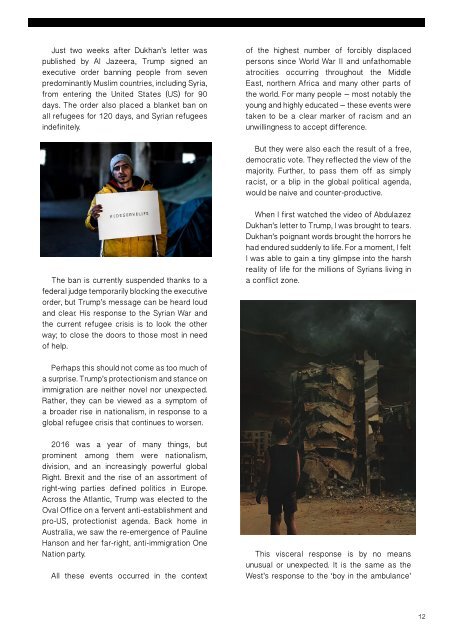Vector Volume 11 Issue 1 - 2017
Create successful ePaper yourself
Turn your PDF publications into a flip-book with our unique Google optimized e-Paper software.
Just two weeks after Dukhan’s letter was<br />
published by Al Jazeera, Trump signed an<br />
executive order banning people from seven<br />
predominantly Muslim countries, including Syria,<br />
from entering the United States (US) for 90<br />
days. The order also placed a blanket ban on<br />
all refugees for 120 days, and Syrian refugees<br />
indefinitely.<br />
of the highest number of forcibly displaced<br />
persons since World War II and unfathomable<br />
atrocities occurring throughout the Middle<br />
East, northern Africa and many other parts of<br />
the world. For many people – most notably the<br />
young and highly educated – these events were<br />
taken to be a clear marker of racism and an<br />
unwillingness to accept difference.<br />
But they were also each the result of a free,<br />
democratic vote. They reflected the view of the<br />
majority. Further, to pass them off as simply<br />
racist, or a blip in the global political agenda,<br />
would be naive and counter-productive.<br />
The ban is currently suspended thanks to a<br />
federal judge temporarily blocking the executive<br />
order, but Trump’s message can be heard loud<br />
and clear. His response to the Syrian War and<br />
the current refugee crisis is to look the other<br />
way; to close the doors to those most in need<br />
of help.<br />
When I first watched the video of Abdulazez<br />
Dukhan’s letter to Trump, I was brought to tears.<br />
Dukhan’s poignant words brought the horrors he<br />
had endured suddenly to life. For a moment, I felt<br />
I was able to gain a tiny glimpse into the harsh<br />
reality of life for the millions of Syrians living in<br />
a conflict zone.<br />
Perhaps this should not come as too much of<br />
a surprise. Trump’s protectionism and stance on<br />
immigration are neither novel nor unexpected.<br />
Rather, they can be viewed as a symptom of<br />
a broader rise in nationalism, in response to a<br />
global refugee crisis that continues to worsen.<br />
2016 was a year of many things, but<br />
prominent among them were nationalism,<br />
division, and an increasingly powerful global<br />
Right. Brexit and the rise of an assortment of<br />
right-wing parties defined politics in Europe.<br />
Across the Atlantic, Trump was elected to the<br />
Oval Office on a fervent anti-establishment and<br />
pro-US, protectionist agenda. Back home in<br />
Australia, we saw the re-emergence of Pauline<br />
Hanson and her far-right, anti-immigration One<br />
Nation party.<br />
All these events occurred in the context<br />
This visceral response is by no means<br />
unusual or unexpected. It is the same as the<br />
West’s response to the ‘boy in the ambulance’<br />
12

















